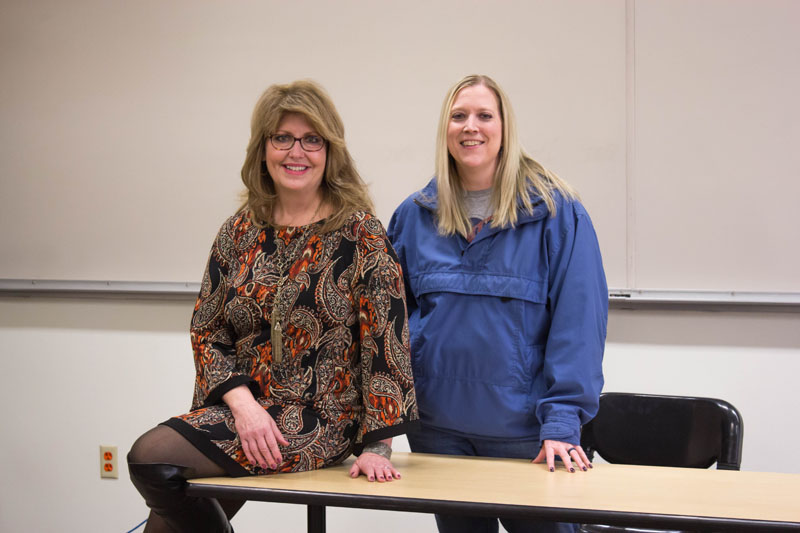
NSP: Q&A with professors
We talked with professors Teresa Wilkerson, M.A., (communications) and Jill Fort, Ph.D., (criminal justice) to find out what they love about the Newman Studies Program (NSP).
Which NSP course do you co-teach?
Teresa Wilkerson: “Killer Communication” is the course, and we’re in our third year of teaching the class. Jill has always taught a class called “Serial Murder” and we thought that would be a great class to combine with communication. We discuss different types of communication theory that would apply to situations with serial killers. BTK, for instance, had created a signature that went along with the way he would kill. There was so much symbolism in that signature. That’s what the class does. It takes a look at the different ways the killers communicated, even with the victims. We have about a dozen different theories we go through.
Jill Fort: The students take three of those theories and apply it to a serial killer. It can be nonverbal or verbal cues exhibited by serial killers. Two individuals we specifically focus on each semester are the Zodiac Killer and BTK. For the others, we may use different examples due to whatever, unfortunately, is happening in the current times. Some are more well-known than others.
What do you think is the most important aspect of NSP?
Teresa: I think it’s the idea of taking two unrelated subjects and being able to see how they are connected. That’s what is going to teach the students how to problem-solve and see the world in a different perspective. Businesses are needing people with good problem-solving skills. When you’re faced with a problem but have a narrow scope, you’re missing many opportunities and ideas to be able to solve that problem.
Jill: The interdisciplinary aspect of it is pretty vital — it’s really crucial for people to understand that we study our discipline almost to excess, so it’s nice to break out of the box and see how criminal justice can intertwine with philosophy, history, communication and even the biological sciences. It’s a lot of fun for us, but it’s also interesting for the students who are introduced to a new way of thinking.
How in your opinion will NSP impact the students’ futures?
Jill: Problem-solving skills — being able to think outside the box, work things out in different, and sometimes unique, ways.
Teresa: Being able to look at a problem or challenge in front of them and removing the bias in order to look at it from a variety of different perspectives. If they leave this class knowing that there is not always a one-size-fits-all solution to a problem, that’s what is important.
What excites you about teaching NSP?
Jill: I’ve taught three separate courses in NSP, and I’ve really enjoyed getting to know my colleagues and being able to learn about their discipline and how to cross-reference each one into my discipline. We definitely learn from each other. I’ve learned a lot about communication theory and wouldn’t have picked that up if it weren’t for NSP. And the give-and-take between the two of us, that is really fun.
Teresa: I feel exactly the same way. I’ve had the opportunity to feel like another student in the class. I’m pretty sure we ask more questions than the students some days. I think that gives the students a cool perspective because we’re learning from other professors. We show our love for learning, too.
Tags: Academics, Newman Studies Program, NSP
